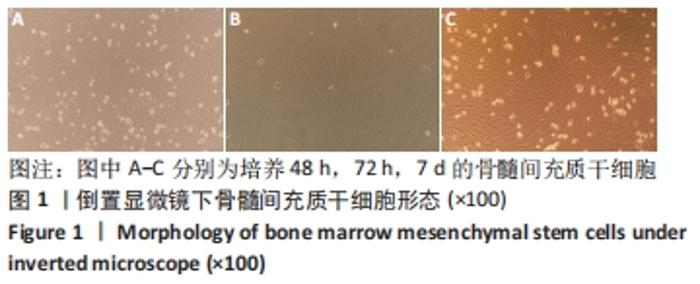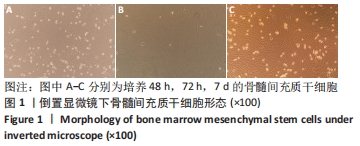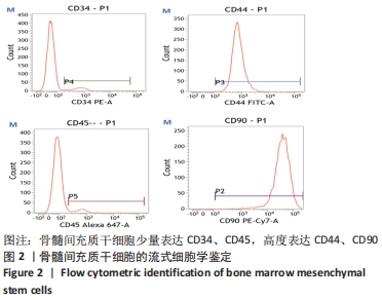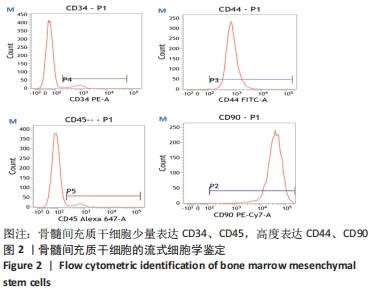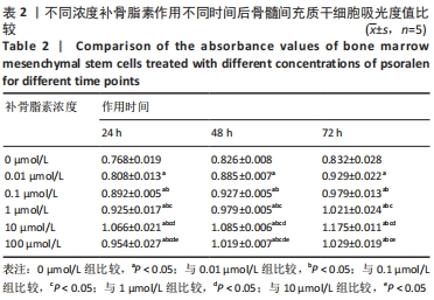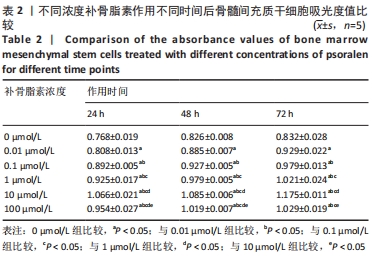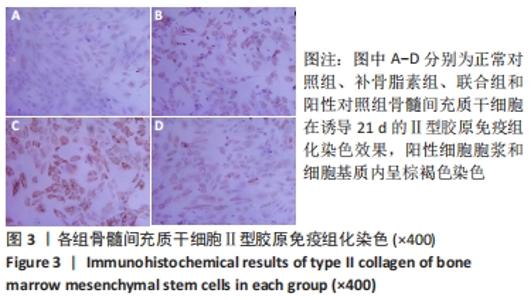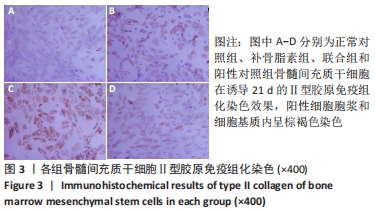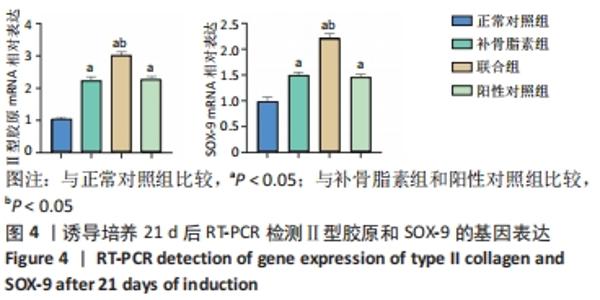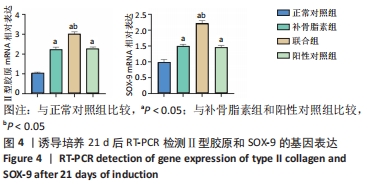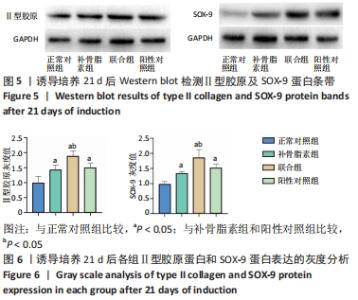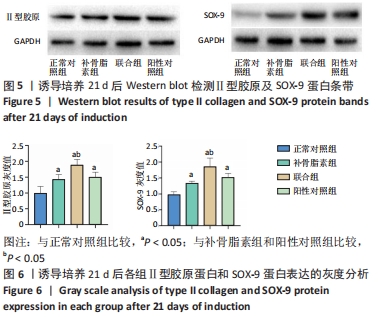[1] CHEN S, SHI J, ZHANG M, et al. Mesenchymal stem cell-laden anti-inflammatory hydrogel enhances diabetic wound healing. Sci Rep. 2015;5:18104.
[2] GOTTIPAMULA S, ASHWIN KM, MUTTIGI MS, et al. Isolation, expansion and characterization of bone marrow-derived mesenchymal stromal cells in serum-free conditions. Cell Tissue Res. 2014;356(1):123-135.
[3] XUE K, QI L, ZHOU G, et al. A two-step method of constructing mature cartilage using bone marrow-derived mesenchymal stem cells. Cells Tissues Organs. 2013;197(6):484-495.
[4] SUN H, HUANG Y, ZHANG L, et al. Co-culture of bone marrow stromal cells and chondrocytes in vivo for the repair of the goat condylar cartilage defects. Exp Ther Med. 2018;16(4):2969-2977.
[5] 张荣华,欧阳菁.肾主骨生髓理论与骨髓间充质干细胞骨向分化[J].中医杂志,2006,47(10):730-732.
[6] 汤化琪.玄胡索散成分分析及其治疗骨关节炎作用机制的网络药理学研究[D].北京:北京中医药大学,2017.
[7] 张永祥.中药药理学新论[M].北京:人民卫生出版社,2004:510-571.
[8] DOMINICI M, LE BLANC K, MUELLER I, et al. Minimal criteria for defining multipotent mesenchymal stromal cells. The International Society for Cellular Therapy position statement. Cytotherapy. 2006;8(4):315-317.
[9] QIN Y, GUAN J, ZHANG C. Mesenchymal stem cells: mechanisms and role in bone regeneration. Postgrad Med J. 2014;90(1069):643-647.
[10] SCOTTI C, PICCININI E, TAKIZAWA H, et al. Engineering of a functional bone organ through endochondral ossification. Proc Natl Acad Sci U S A. 2013; 110(10):3997-4002.
[11] YAO Y, CHEN R, WANG G, et al. Exosomes derived from mesenchymal stem cells reverse EMT via TGF-β1/Smad pathway and promote repair of damaged endometrium. Stem Cell Res Ther. 2019;10(1):225.
[12] LI J, ZHAO Z, LIU J, et al. MEK/ERK and p38 MAPK regulate chondrogenesis of rat bone marrow mesenchymal stem cells through delicate interaction with TGF-beta1/Smads pathway. Cell Prolif. 2010;43(4):333-343.
[13] LIAO J, HU N, ZHOU N, et al. Sox9 potentiates BMP2-induced chondrogenic differentiation and inhibits BMP2-induced osteogenic differentiation. PLoS One. 2014;9(2):e89025.
[14] GÓMEZ-LEDUC T, HERVIEU M, LEGENDRE F, et al. Chondrogenic commitment of human umbilical cord blood-derived mesenchymal stem cells in collagen matrices for cartilage engineering. Sci Rep. 2016;6:32786.
[15] LI Y, EL MOZEN LA, CAI H, et al. Transforming growth factor beta 3 involved in the pathogenesis of synovial chondromatosis of temporomandibular joint. Sci Rep. 2015;5:8843.
[16] 闫继红,杨姝,孙海梅,等.共沉默mi R-221-3p/222-3p表达抑制骨髓间充质干细胞增殖及促成软骨分化[J].中国组织工程研究,2015,19(50): 8056-8061.
[17] 王浩,陈森,马雨洪,等.微小RNA-23a调控大鼠骨髓间充质干细胞成软骨分化的实验研究[J].武汉大学学报(医学版),2014,35(4):493-497.
[18] NUTTELMAN CR, TRIPODI MC, ANSETH KS. Dexamethasone-functionalized gels induce osteogenic differentiation of encapsulated hMSCs. J Biomed Mater Res A. 2006;76(1):183-195.
[19] LINKHART TA, MOHAN S, BAYLINK DJ. Growth factors for bone growth and repair: IGF, TGF beta and BMP. Bone. 1996;19(1 Suppl):1S-12S.
[20] 俞猛,于方,付胜良.兔骨髓间充质干细胞体外培养定向诱导分化为软骨细胞[J].中国组织工程研究与临床康复,2011,15(27):4951-4954.
[21] 李全修,董树平,刘欣,等.外源性转化生长因子β1对胎儿软骨终板细胞Ⅱ型胶原和蛋白多糖的影响[J].医学临床研究,2012,29(6):1083-1085.
[22] GU J, GU W, LIN C, et al. Human umbilical cord mesenchymal stem cells improve the immune-associated inflammatory and prothrombotic state in collagen type-Ⅱ-induced arthritic rats. Mol Med Rep. 2015;12(5):7463-7470.
[23] 姚长风,张晓军,杨永晖,等.补骨脂素对大鼠腰椎间盘软骨细胞炎性退变的影响[J].中医杂志,2014,55(7):594-598.
[24] 杨荣平,寿清耀,涂永勤,等.补骨脂提取物对体外培养新生大鼠颅骨成骨细胞的影响[J].中药新药与临床药理,2007,18(1):32-34.
[25] 明磊国,葛宝丰,陈克明,等.异补骨脂素对体外培养骨髓间充质干细胞增殖与成骨性分化的研究[J].中国中药杂志,2011,36(15):2124-2128.
[26] 黄显章,赵清超,袁林.中药有效部位 (群) 研究在中药及复方研究中的优势与展望[J].江苏中医药,2010,42(5):1-3.
|
